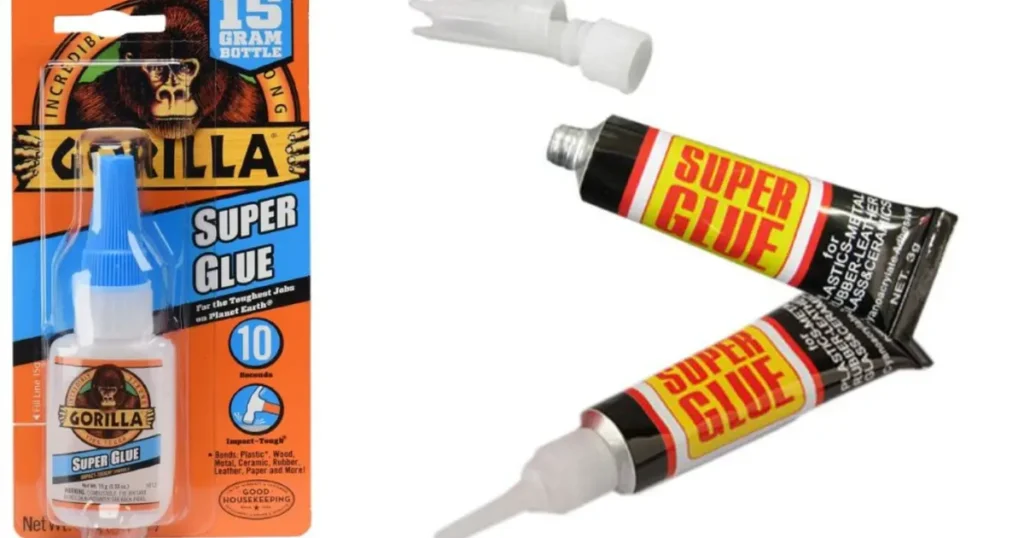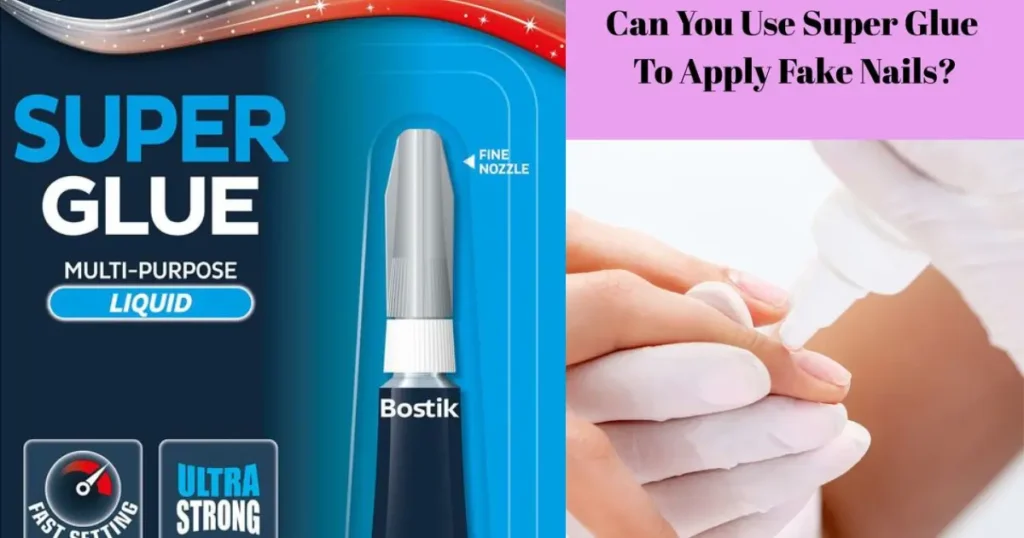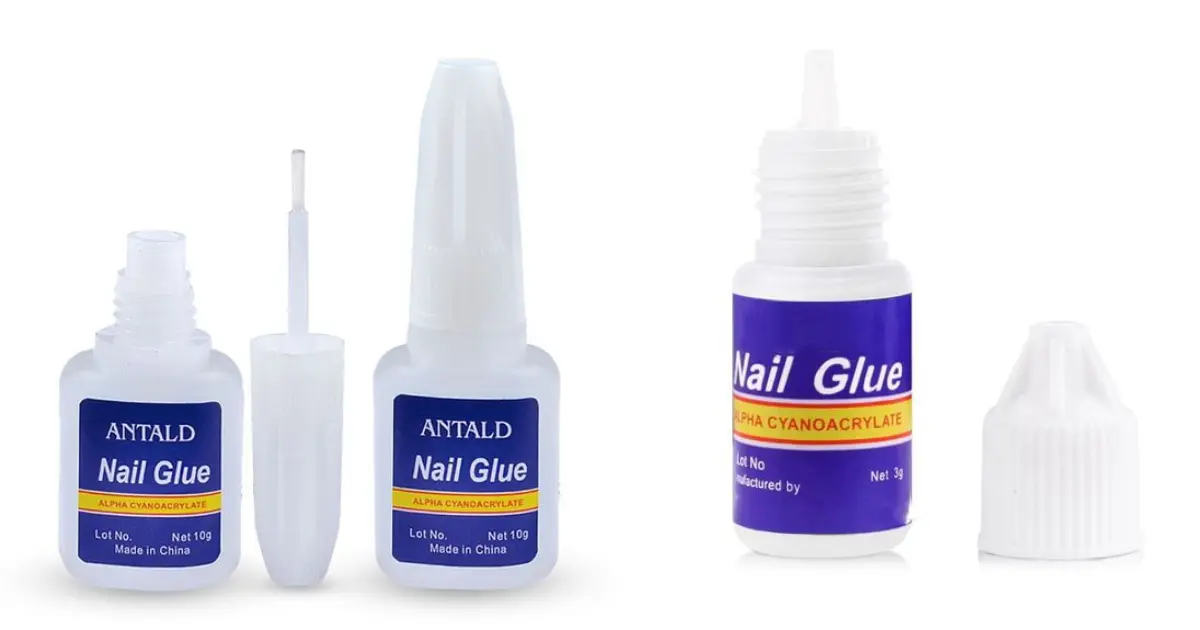Introduction
One of the first things to have for a DIY manicure, or doing any sort of nail art is nail glue. But, confusion often arises between nail glue and super glue. While both items are, of course, adhesives and have the strength to bond plastic materials together upon creation for life extension purposes their formulations differ in order to meet the requirements specific to them. However, this section of the post will explain what makes nail glue vs super glue different and also unpack their similarities: contents, uses; how safe either is to use as well as why you should not be adhering to that adage about banging nails with a hammer peg-go-between yourself.
What is Nail Glue?

Nail Glue; This is a dedicated adhesive for nails and has been created as such. It is often used to adhere false nails, nail tips or a design onto your own natural fingernail. Nail glue is sold in small tubes or bottles, and it lasts longer than expected when properly applied due to its significant strength while still being safe for the natural nail.
Key Ingredients in Nail Glue
A cyanoacrylate is the main active ingredient of nail glue, which is DoubleClick used in superglues. Still, nail glue is typically mixed with other elements to make it more appropriate for nails and skin. And this creature could contain these ingredients
- Ethyl Cyanoacrylate: Quick setting glue that activates upon contact with moisture.
- Benzoin Resin — Adhesive is added by it, helps to make the bond strong but not stiff.
- Polymethyl Methacrylate (PMMA): For the reinforcement of adhesive bond.
- Hydroquinone is an inhibitor to prolong the degradation of glue
What is Super Glue?

Glue is an adhesive or sticker, which you might use in some craft project when on the other hand super glue is a strong adhesive used for different kinds of home repair requirements. Yes, it can join plastic to metal or ceramic (and even some fabrics). Super glue uses cyanoacrylate too instead of nail glue. Super glue is designed to create near-permanent and extremely strong bonds that can withstand a great deal of force: the exact opposite of what we want.
Key Ingredients in Super Glue
Super glue is made of cyanoacrylate, which is also the main ingredient in nail glue but superglue has a different formulation. Commonly found as a super glue, the following are general ingredients in generic products.HttpServletResponse
- Methyl Cyanoacrylate: An adhesive that sets quickly and is capable of bonding materials within seconds.
- Plasticizers — used to increase the impact and temperature resistance;
- Viscosity modifiers : They change the viscosity of glue and prevents from running or spreading too thinly while applying.
- Stabilizers: compounds such as hydroquinone are also added to stop the glue curing prematurely, thereby extending its shelf life.
Key Difference Between Nail Glue and Super Glue
Although nail glue and superglue do have an ingredient in common, they are not the same. The difference is in their compounds, how you apply them and what they are meant to do.
1. Formulation and Ingredients

Not only a nail glue crafted to be more gentle on your nails and skin, but you also add things inside the bottle that make the bond slighter flexible than others, less prone to cracking etc. The formula is supposed to be durable enough that it helps the nails from damaging but also gentle so as not to harm your nail when taken off.
- Super Glue: Primarily for industrial or household use, super glue makes a much stronger bond. Although it is quick-drying and provides a high-strength bond to many different materials, this glue has one main disadvantage: its inflexibility makes Long-Term Acrylic Nail Repair impossible with Super Glue.
2. Application
- Nail Glue: Although this type of glue is designed to be used on nails, we added it here anyway because nail glues dry in a snap but not at the speed of light – meaning that you have a bit longer than an instant application-time if your artificial nails or decorations need repositioning. It is also formulated to be used with the natural oils and moisture found in nails, creating a potent but removable bond.
- Super Glue: Super glue is meant to stick fast and hard, becoming difficult to maneuver as soon as it’s applied. This is a type of glue known for its ability to form permanent bonds and it can be very hard to remove, particularly from skin or nails.
3. Bond Strength and Flexibility
- Nail Glue: Nail glue forms a tight seal between the natural and artificial nail strong enough to last for days or weeks, but it remains flexible. This is necessary as it allows the false nail to flex with one’s natural nails so you’re not at risk of damage or pain.
- Crazy Glue: Crazy glue will set rigid – this means the break is not as easily flexed. Although it is the best for repairing broken-down objects, or bonding material like plastics together with metals, when used on nails then this creates a problem. The stiffness of the bond magazine will cause nail breakage, cracking or discomfort.
Why Super Glue Is Bad For Nails

Because super glue shares a lot of ingredients in common with nail glue, you may be tempted to use it as an alternative. On the other hand, if one tries to do so it will give rise to many issues.
1. Risk of Nail Damage
The inflexible bond of super glue can also cause extensive harm to your nails. Whereas nail glue is made to be pliable, and thus easy to remove superglue can really destroy your natural nails if you are not careful. This firm bond can cause splitting, tearing or even peeling off the natural nail layer when trying to take it away.
2. Skin Irritation
Super glue is not meant to be used on human skin and can result in burns or irritations. It fuses to the skin nearly immediately once applied, and is excruciatingly uncomfortable when pulled off of the sin (and can cause nasty burns). In contrast, nail glue is designed to be skin- and-nail-safe — it was made specifically for your hands, after all.
3. Removal Difficulties
Super glue is so hard to remove from nails and even skin. Acetone is not only too harsh and drying to nails, it also evaporates way too quickly. However, acetone may not melt the bond completely and as a result you could pry or peel off remaining residues harming your natural nails in the process.
4. Aesthetics and Performance
Yes, super glue is not intended for cosmetic use. This leaving it to dry can be done with a shiny finish, but is not ideal for the even layer you are hoping to produce from your manicure. Plus, because super glue is so hard and inflexible once it dries, the bond will not work for a long time and may just end up with crack or break your fake nails.
Nail Glue Substitutes For Safety
- If you do not have nail glue or contact lens solution, it is important that safe alternatives are used instead of attempting to use superglue. Some options include:
- Double-Sided Nail Adhesive Tabs: for a perfect quick fix to stick on fake nails. They are easily slipped on and off, which makes them perfect for shorter durations.
- If you want to make your own simple nail glue from home have a look at this DIY Nail Glue!! And it can easily double as a (not terribly strong, but better-than-nothing) nail glue in a pinch!
- Nail Wraps: You can find nail wraps or stickers that could be the easiest solution for creating some of your Nail Art/Decorations without using glue.
Conclusion
Although nail glue and super glue are both cyanoacrylate based, they have been developed for entirely different functions. Nail glue is made to be safe and effective on nails, creating a flexible yet strong bond that comes apart without causing damage to the natural nail. It is an incredibly strong adhesive, no doubt about it but not suitable for your nails since it’s far too rigid and can be tough to remove without damaging them.
Everything in moderation and all that — leave the super glue where it belongs (with your duct tape) and stick to nail glue for your manicures. The differences between these two adhesives can help you take care of your nails so that they always look good and you will have fewer risks when using a product.
Related Article : Nail Glue vs Super Glue
1. Nail Glue vs Super Glue
Nail glue is not super glue, though they have some common features. Nail glue is made to use on nails and, therefore, has components that protect the nail as well adhere better. On the other hand, super glue is a common adhesive and using that on your nails may not be the safest or most gentle option.
2. Is Super Glue Nail glue really?
Super glue is an alternative that can be used in place of nail glue if you really need it (in a pinch) although we don’t recommend its constant use. While super glue can irritate and potentially even damage the underlying nail bed, as well. Nail glue, on the other hand, is made to be more sympathetic and suitable for use with nails.
3. Nail Glue Vs Super Glue
These additives that are part of the formulation allow nail glue to better adhere to the skin and once again, reduce irritancy. And superglue, as potent and fast-acting an adhesive it may be, does not contain that little bit of additives in store-bought nail glue which can make your nails a lot safer to use.
4. Are superglue nails bad for you?
It is true that nail glue is usually safer on nails. Shaped to work with your nail’s natural anatomy, this water-in-oil base coat features reparative ingredients. Super glue is a general-purpose adhesive that will not be able to release the nails with these advantages, but may cause harm and irritation.
5. Could Super Glue ruin my nails?
Yes, super glue can weaken and harm your nails. It can make nails brittle, dry them out and in the end they may break or tear off. Glue for anything other than a false nail is not at all suitable as it works very differently due to superglue technology which does nothing good to your central layer of the nail, what we call body with natural grown ones! My solution is to use a product that was made and designed for the beauty of nails.
6. Whoops I Used Super Glue On My Nails!
Avoid peeling or pulling off super glue if you have mistakenly used it over your nails since this could further damage them. Soak your nails in warm, soapy water or use a fine-grit nail file and acetone-based nail polish remover until the glue dissolves.
7. Is There More to Nail Glues Than Being A Super Type of Crazy Glue?
With the use of nail glue: As it is used on only fake nails or in ordering a crushed one It is not as strong or versatile of a material overall compared with super glue, but it can come in handy for minor stuff elsewhere. The best you can do is use each product for what it was intended hence.
8. What Makes a Nail Glue Differ from Say, SuperGlue?
Most nail glue is designed to hold on nails a few days to two weeks. While it is a powerful glue, Super Glue may not create as secure of bonds on fingernails due to the way nails are made up and interact with this type of adhesive.
9. Nail glue vs Super Glue Cross reference
Nail glue is best for nails — as it was created to adhere your tips and acrylics together in the first place. It is less abrasive to the skin and nails yet forms a very strong bond that does not damage your item. So, it is better to avoid super glue on nails as the harm is not safe.
10. Common Nail Glue Substitutes
You can opt for adhesive tabs, gel adhesives or a brush-on nail resin as safer options if you’re out of nail glue. The super glue can be used in an emergency but is not advice to use for days together.

